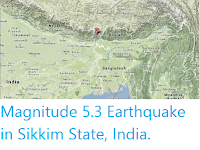A 50-year-old woman has died and another two people have been injured after their house was destroyed by a landslide in the village of Upper Lingchom in the North Sikkim District of Sikkim State, India, on Sunday 24 May 2020. The landslide is reported to have come after days of heavy rain in the area, associated with Cyclone Amphan, made landfall in West Bengal and Bangladesh on Wednesday on Wednesday 20 May, causing over a hundred fatalities. Landslides are a common problem after severe weather events, as excess
pore water pressure can overcome cohesion in soil and sediments,
allowing them to flow like liquids. Approximately 90% of all landslides
are caused by heavy rainfall.
The scene of a landslide that killed a woman in North Sikkim on Sunday 24 May 2020. Point Media Siliguri/Facebook.
Tropical
storms, called Cyclones in the Indian Ocean and South Pacific, are caused by solar energy heating the air above the oceans,
which causes the air to rise leading to an inrush of air. If this
happens over a large enough area the inrushing air will start to
circulate, as the rotation of the Earth causes the winds closer to the
equator to move eastwards compared to those further away (the Coriolis
Effect). This leads to tropical storms rotating clockwise in the
southern hemisphere and anticlockwise in the northern hemisphere. These
storms tend to grow in strength as they move across the ocean and lose
it as they pass over land (this is not completely true: many tropical
storms peter out without reaching land due to wider atmospheric
patterns), since the land tends to absorb solar energy while the sea
reflects it.
Despite the obvious danger of winds of this speed, which can physically
blow people, and other large objects, away as well as damaging buildings
and uprooting trees, the real danger from these storms comes from the
flooding they bring. Each drop millibar drop in air-pressure leads to an
approximate 1 cm rise in sea level, with big tropical storms capable of
causing a storm surge of several meters. This is always accompanied by
heavy rainfall, since warm air over the ocean leads to evaporation of
sea water, which is then carried with the storm. These combined often
lead to catastrophic flooding in areas hit by tropical storms.
See also...
Follow Sciency Thoughts on Facebook.







